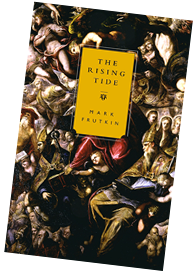
The Rising Tide
(Porcupine’s Quill, 2018)
Venice, 1769. Rumours of the Second Coming of Christ abound in the City of Masks. Michele Archenti, publisher, former priest and current confidant to the mysterious skeleton-bearer, Rodolfo, finds himself swept up in a rising tide of politics, ambition and lust in eighteenth-century Venice.
The City of Masks is awash with rumour. A strange man haunts the nearby island of Torcello, a skeleton strapped to his back. A wolf wearing a priest’s cassock is spotted running through the fields. A mysterious courtesan bears signs of a most unusual form of stigmata.
Michele Archenti, former priest and devil’s advocate, and current publisher of a scandalous collection of erotic poetry, becomes reluctantly embroiled in political intrigue. Called upon to defend the skeleton-bearer—his friend Rodolfo—against charges of heresy, Archenti must navigate the murky political waters as well as the less-frequented canals of Venice, and outsmart the ambitious new Inquisitor from Rome who vows not only to prosecute the heretic, but to see him burn. In the heady, uninhibited days of Carnival, the signs are ripe: the citizens of Venice prepare for the Second Coming of Christ.
“THE RISING TIDE is a delicious read overflowing with skullduggery, sorcery, scandal, and political intrigue deftly delivered with a sly comedic undertone. All things to excess might well have been the motto of Frutkin’s 18th century Venice, which includes a selection of exceedingly malodorous cheeses named after intimate bodily fluids and organs, a wolf wearing a priest’s cassock, a former priest living in a bordello, a virgin courtesan marked by a shocking version of stigmata, and a strange skeleton-bearing man who may or may not be Christ Almighty Again.” (Diane Schoemperlen)
“Packed with the intrigue, wildness, and complexities of 18th Century Venice, The Rising Tide is a rollicking, lush book full of gorgeous description and memorable characters. (Open Book, open-book.ca)
“…the book’s tonal dissonance runs in delicious counterpoint to the characters’ self-seriousness, and to great comic effect. … Filled with witticisms, wordplay, and an enticing blend of humor and tragedy, the novel’s ideas of apocalypse are wedded to a wry knowing that unveils the antics embedded in mechanisms of power and human machinations alike.” (Foreword Reviews)
More...
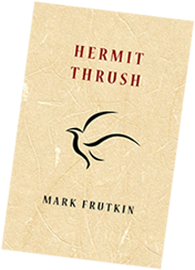
Hermit Thrush (Poetry)
(Quattro Books, 2015)
Lightness, clarity, freshness, simplicity – all can be used to describe this latest collection of poems by Mark Frutkin. Throughout, the poet shines his light on subjects as diverse as the cathedral of Chartres, ancient Chinese poets, the art of listening, and tiny, black beetles that devour books. Poems as thin and sharp as a blade and as sweet as honeysuckle. A unique work that dissolves into the silence of dusk like the lucid, haunting knock of the hermit thrush.
More...
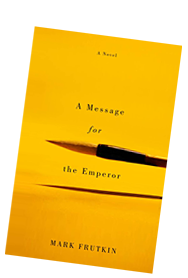
A Message for the Emperor (Novel)
(Vehicule Press, 2012)
Li Wen, a landscape painter of the Song Dynasty (960-1279 AD), is on a journey to deliver a message to the Chinese Emperor in the far-off capital city of Linan. His teacher has instructed him to paint four landscapes, one for each season, during the year it will take him to travel across China to the Emperor’s Court where he is to present the paintings to the Emperor as a long-life gift. A series of gripping adventures befall Li Wen on his journey, including burial in an ancient tomb and a snowstorm that nearly ends his quest.
A fascinating re-creation of the period and an exploration of an artist’s mind and creative essence, the novel takes the reader right into the heart of the stunning Chinese landscape and the bustling city of Linan. This is a unique novel of old China, the traditional landscape of mountains and rivers without end, and life in an imperial city rife with plots, intrigues, culture, sensuality and wealth.
“I loved A Message for the Emperor. The prose is sleek, restrained, flawless. There’s research in there but you’d never know it. Frutkin seems to have inhaled ancient China and exhaled a parable of the artist.” (Katherine Govier)
“Overflows with the kind of rich detail about time, place and landscape normally found in the very best travel writing. Emperor leaves you dazed from a quick trip to 12th century China.” (Paul Gessell, Montreal Gazette)
“This short, delightful novel is poetic, cinematic, and fable-like.” (Paul Gessell, Quill & Quire
More...
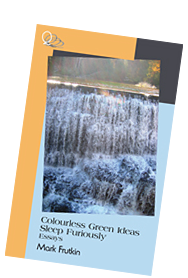
Colourless Green Ideas Sleep Furiously (Short Essays and Alternative Versions)
(Quattro Books, 2012)
In the tradition of Kafka’s Parables and Paradoxes and The Book of Embraces by Eduardo Galeano, this small collection of short essays and ‘alternative versions’ is a vivid, perhaps even shocking, reminder that language, self, reality are based on social consensus, an unspoken agreement to see the world in a particular, limited way.
By breaking open these conventions, Colourless Green Ideas reveals the possibilities inherent in the human story.
To ‘sleep furiously’ is to dream. Once we know we are dreaming, we begin to consider the possibility of waking up.
“Frutkin’s tell-it-slant meditations on language, meaning, and life create an argument that is also a dream, an intellectual conversation conducted in poetic diction. More than a collection of aphorisms, this slim book is a manifesto for clear and creative thought.” (Mark Kingwell)
“...thought-provoking meditations, engaging explorations...a book to savour. Completeness, a sense of symmetry, a profundity based in clarity and simplicity; it’s all here.” (Heidi Greco, Prairie Fire Review)
More...
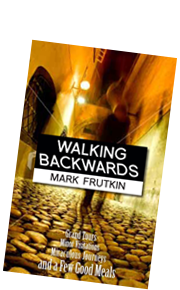
Walking Backwards (Grand Tours, Minor Visitations, Miraculous Journeys and a Few Good Meals)
(Dundurn Press, 2011)
From Istanbul to New Delhi to Boulder, Colorado, through Venice, Paris, Rome and points between...
As travelers, we are always ‘walking backwards’, forever on the verge of stepping into the unknown, never knowing what waits around the next corner.
You could be lost, forget your passport, fall ill. You could be served a bowl of food and not know whether it’s animal, vegetable or mineral. Even flushing the toilet can be an adventure.
You are a child again, innocent and hoping for the best, forced to trust strangers. Quite often this works out. Not always.
Walking Backwards is Mark Frutkin’s return to ten cities and what happened there. Whether inadvertently smuggling ‘cloth’ into Istanbul, reading poetry in New Delhi to a crowd expecting a world-famous pianist, or wandering endlessly through Mantua searching for a non-existent hotel on a street that has fallen off the map, Frutkin is a master at rediscovering the magic at the heart of all travel.
“His innocence is charming, his wit razor sharp. This is a lovely read.” (The Globe and Mail)
“A reminder of the travellers we once were...entertaining.” (Quill & Quire)
More...
|








